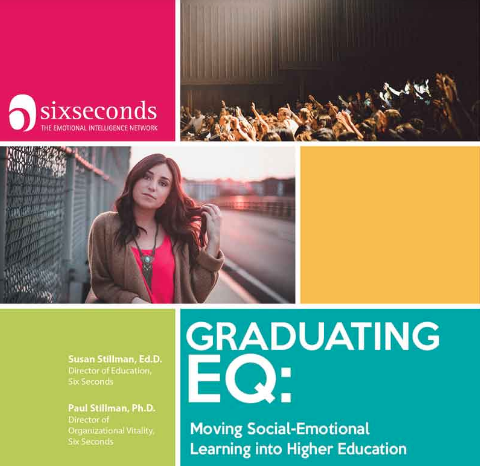Emotional Intelligence, Essential for Doctors’ Success, Found to Decline During Medical School
Research at Liberty University sheds light on the need for focused development of physicians’ EQ skills
Medical school erodes future doctors’ emotional intelligence, according to recent research published in the Journal of the American Osteopathic Association.
Consider the irony: The system we’ve set up to train doctors, whose job it is to keep people healthy, is undermining their own mental and emotional health. And while a growing body of evidence suggests that the skills of emotional intelligence drive doctors’ success both personally and professionally – and positive outcomes for patients – these findings suggest that doctors may be losing these skills during their training. For anyone who cares about the quality of their healthcare, this should serve as a wake-up call. Dr. Linda Mintle, who conducted this research at Liberty, shares her reaction to the findings and what they plan to do with it. But first, let’s step back to look at research that has driven a resurgence of interest in EQ in healthcare.
Research: Physicians’ EQ Linked to Patients’ Outcomes
A growing body of evidence shows that physicians’ emotional intelligence skills aren’t just ‘nice to have,’ but have a direct effect on patient outcomes. “In order to be successful with patients,” says Dr. Mintle, “doctors need to have more than medical knowledge.”
Why is EQ important for doctors? Emotional intelligence is the ability to recognize and respond appropriately to your own and others’ emotions. It’s the bedrock of our ability to practice empathy, to motivate ourselves and others, and to form meaningful connections. “In the changing landscape of modern healthcare, with its focus on patient-centered care and collaboration,” Dr. Mintle says, “a physician’s emotional intelligence is essential to providing quality care.” This statement is increasingly grounded in objective data: A physician’s EQ, or lack thereof, ultimately impacts their patients’ health outcomes.
If that seems like a jump, consider this study of diabetic patients from Jefferson Medical College in Philadelphia, USA. In the study, 891 diabetic patients were treated by 29 different physicians. The physicians took an empathy assessment, and then the researchers analyzed the doctors’ empathy scores compared to objective patient health data.
What did they find?
A strong correlation between physicians’ empathy scores and patients’ health outcomes, as measured by levels of hemoglobin in the blood.
Research studies like these are driving a resurgence of interest in EQ in healthcare, including this research at Liberty.
In a data driven field such as healthcare, measuring the skills of emotional intelligence provides a way to focus on these essential capabilities and leverage them for success.
And why not start early in doctors’ careers? This cutting edge research at Liberty tested 62 medical students’ EQ when they arrived on campus for orientation, and then again after Year 2. They wanted to know: How is medical school affecting these future doctors’ EQ?
[tweet_box design=”box_10″ float=”none”]Physicians’ empathy levels linked to diabetes patients’ hemoglobin levels. Relationships, and emotions, have physical effects.[/tweet_box]
Research: Medical School Erodes Students’ EQ
According to the results, students leave medical school with less emotional intelligence than when they arrived. Emotional intelligence declined across the board. Of the eight emotional intelligence competencies measured in the study, 6 declined and the other 2 stayed the same. Check out the Six Seconds Model of EQ to read about the 8 core skills of emotional intelligence measured in the study. Among the skills that declined are the ability to exercise optimism, evaluate the costs and benefits of choices, and practice empathy. Yikes.
Considering physicians are making complex, life saving decisions, and that optimism and empathy have been directly linked to positive patient outcomes, this is an alarming finding.
And unfortunately, this is not an isolated finding in terms of the negative impact of medical school on students’ mental, physical and emotional health.
A 2016 meta-analysis in the Journal of the American Medical Association found that 27% of medical students reported suffering from depression or depressive symptoms. A separate study done by Cardiff University in the UK reported that more than half of medical students admitted to feeling serious levels of anxiety. In general, medical students suffer from anxiety, depression and suicide at much higher rates than the general population.
Why? The problem, according to students and teachers, is multifaceted.
First and foremost, students face unreasonable demands on their time, with frequent high pressure exams followed by 70-hour weeks during clinical rotations. This leaves students with insufficient time for adequate sleep, healthy eating, and regular exercise. On top of that, many students are far from home with small or nonexistent support systems, and dealing with uniquely stressful situations like witnessing death for the first time. It all adds up to extreme mental health challenges, and the erosion of the exact social emotional skills doctors need to provide top quality care.
Dr. David Muller, dean of medical education at the Icahn School of Medicine at Mount Sinai in New York, says medical educators must recognize their role in what’s happening: “We want our students to show love and compassion for patients, and meanwhile get 99% on everything. There’s hypocrisy on our part as medical educators.”
According to Dr. Mintle, measuring students’ EQ is a vital first step toward reversing this trend and forging a new path. “Because we want to develop high EQ doctors, it is important to know when the erosion of EQ begins or if medical students lack high EQ at the beginning of medical school. Then we can integrate EQ training into the curriculum.”
That EQ training component, it turns out, has been on the Liberty team’s mind from the beginning of the study.
“We chose the Six Seconds SEI assessment,” Dr. Mintle says, “because of its potential application for coaching.” The assessment provides feedback on different aspects of emotional intelligence within a framework for putting it into action and growing EQ, making it ideally suited for training and development.
At Liberty, Dr. Mintle hopes to use the assessments, coupled with coaching, to help students raise their EQ scores during their time in medical school – setting them up for success, both personally and professionally.
Note: In Chicago, Illinois, Six Seconds Preferred Partner EQuip Studios is just finishing up research where they attempted to improve medical students’ EQ scores using the SEI assessment and a new tool for teaching EQ called The Practice. An article analyzing that research study is coming soon.
If this research piques your interest, what are next steps?
[tweet_box design=”box_10″ float=”none”]Medical students’ emotional intelligence skills – including the ability to exercise optimism, evaluate the costs and benefits of choices, and practice empathy- found to decline during med school.[/tweet_box]
Download our free eBook, Graduating EQ: Moving SEL Into Higher Learning. If you are interested in measuring or teaching emotional intelligence in a higher education setting, downloading this free eBook is a great place to start.

Follow these 3 steps:
Prioritize SEL
In the medical education system, as in much of the education system, cognitive development is treated as the crown jewel while social emotional development is treated as an afterthought. Even as research continues to pile up indicating that EQ is twice as predictive of success as IQ, training has yet to catch up. The vast majority of medical school is spent memorizing, studying causes and effects, and building associative skills. Crucial SEL skills such as knowing your patterns and triggers, emotional regulation, managing difficult conversations and building empathy are given little thought. If medical educators are serious about producing the highest quality physicians, the curriculum needs to reflect the growing importance of EQ.
Measure Students' EQ
It is often assumed that while emotional intelligence is important, it is unmeasurable and unchangeable. These are both misconceptions. There are many valid emotional intelligence assessments and research has found repeatedly that EQ skills are learnable. In fact, the SEI assessment was selected for this study because of its robust psychometrics and potential to develop coaching and training tools. Many other EQ assessments provide data, but the SEI provides data within an actionable framework to practice and improve emotional intelligence, which leads us to our final recommendation…
Support Students with EQ Training
Measuring students’ EQ, of course, is just the first step. The end goal is to have emotionally intelligent physicians who can empathize with patients, motivate them to change, work on interdisciplinary teams, and cope with stress and organizational demands. Medical schools can and should develop EQ development programs for their students. These could be group coaching or 1-1. Innovative tools like THE PRACTICE can be utilized in conjunction with the SEI to develop personalized training and development programs based on each student’s strengths and challenges. It’s time for EQ training to be treated not as a nicety, or an optional add-on, but as a foundational tool that doctors need to do their jobs effectively.
What’s new in emotional intelligence?
Leading Change in Times of Uncertainty: Why Managing Transitions Matters More Than Strategy
Leading change in times of uncertainty requires more than strategy. Learn why emotional transitions, trust, and purpose drive sustainable change.
Emotion AI: A Leader’s Guide to Use Emotional Intelligence for Effective AI Adoption and Change Management
AI adoption challenges are emotional before they’re technical. Learn how fear, curiosity, and emotional intelligence shape whether AI succeeds in your workplace.
Requesting Trust: 5 Practical Steps to Repair and Increase Trust
Want to increase trust with someone? Try this challenging-but-rewarding framework for requesting trust.
Emotional Intelligence in Healthcare: A Quick Check-In Guide to Improve Patient Care and Reduce Burnout
Discover how emotional intelligence can help healthcare professionals reduce burnout, strengthen teamwork, and improve patient care.
Leading Your Team Through Change
When facing challenges leading team change, increasing trust, vitality and purpose are key factors to success.
Grappling with Challenging Emotions as a Manager: 18 Effective Emotional Intelligence Strategies
On average, you and every person you interact with is experiencing more distress than you did just a few years ago. The heightened level of struggle presents a profound leadership challenge – here’s how to use emotional intelligence to handle difficult emotions, starting with your own.







